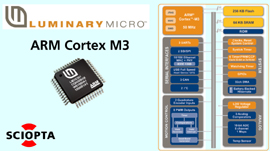
SCIOPTA Systems AG a technolgy leader in system software for safe and reliable embedded systems, today announced the immediate availability of its real-time operating system targeting Luminary’s Stellaris® microcontrollers, built on ARM® Cortex™-M3 technology.
The SCIOPTA ARM Cortex RTOS is written in highly optimized assembler and specifically tuned for the Luminary Stellaris® microcontrollers (MCUs). This results in a very high performance and a low memory footprint.
SCIOPTA is fully dynamic. All system resources such as modules, processes and message memory pools can be created and killed during run-time.
Beside the fast Real-Time Kernel there is IPS (Internet Protocols, TCP/IP), IPS Applications (Web Server, DHCP, DNS, SMTP, Telnet, TFTP etc.), SFATFS (FAT File System), SFFS (Flash File System), USB Host and Device support, embedded GUI graphics support and the DRUID System Level Debugger available.
SCIOPTA is royalty free and supports actually the C/C++ compilers and environments from GNU GCC and IAR Systems. A precompiled version of GCC is included on the SCIOPTA CD.
Luminary’s Stellaris® Microcontrollers
Luminary Micro, Inc. designs, markets, and sells ARM® Cortex™-M3-based microcontrollers (MCUs).
As ARM’s lead partner for Cortex-M3 technology, Luminary Micro delivers the world’s first silicon implementation of the Cortex-M3 processor, providing 32-bit performance at 8-/16-bit cost. Luminary Micro’s award-winning Stellaris family of microcontrollers incorporates the Cortex-M3 MCU core running up to 50 MHz, embedded flash and SRAM, a 32-ch DMA, a low drop-out voltage regulator, battery backed low-power hibernation capability, integrated brown-out reset and power-on reset functions, analog comparators, 10-bit ADC, GPIOs, and watchdog and general purpose timers. The family also integrates several serial interfaces, including 10/100 Ethernet MAC+PHY, CAN, USB On-The-Go, USB Host/Device, SSI/SPI, UARTs, and I2C. Finally, the Stellaris family features peripherals designed specifically for intense industrial motor control, including motion control PWMs and quadrature encoder inputs.
With every peripheral provided directly to the pins without feature multiplexing, the Stellaris family is favorably positioned for cost-conscious applications requiring significant control processing and connectivity capabilities, including motion control, monitoring (remote, fire/security, etc.), HVAC and building controls, power and energy monitoring and conversion, network appliances and switches, factory automation, electronic point-of-sale machines, test and measurement equipment, medical instrumentation, and gaming equipment.
